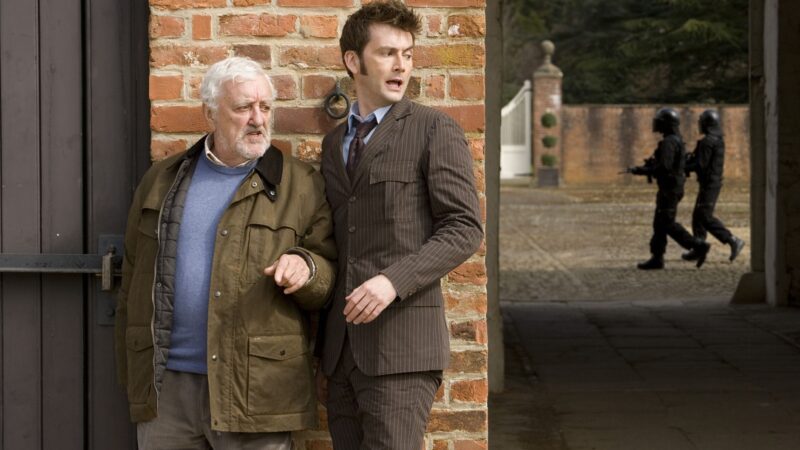Wilfred Mott was perhaps the briefest and the most senior of the Doctor Who companions, travelling with the Tenth Doctor David Tennant.

That being said, the first time we met Wilfred Mott, we didn’t actually learn his name. He made a brief appearance in the 2007 Christmas special ‘Voyage of the Damned’ as a newspaper seller who was becoming frustrated (and more than a little bit anxious) about the increase in alien activity on planet Earth. Little did anyone know that Wilf would soon join the roster of David Tennant’s Doctor Who companions.
Initially, Wilf’s scene in ‘Voyage of the Damned’ was a one-off, intended as a cameo for the renowned British actor Bernard Cribbins, who incidentally also played one of the Doctor Who companions in Daleks – Invasion Earth: 2150AD, one of the 60s Dalek movies starring Peter Cushing.
And Cribbins’ appearance may have remained a cameo had it not been for a tragic death in the Doctor Who cast. In the 2008 series, the Tenth Doctor re-encountered his old friend Donna Noble (played by Catherine Tate) along with her family parents Geoffrey and Sylvia Noble. The former was an astronomy enthusiast played by Howard Attfield, who would play a large part in the series opener ‘Partners in Crime.’
And although Attfield had already started filming alongside Catherine Tate and the rest of the cast, he sadly passed away before he could finish his scenes. This presented something of a continuity problem; re-casting his part would be tricky as Attfield had already appeared as Donna’s father in the earlier Christmas special ‘The Runaway Bride.’ Davies also stated that he didn’t want Attfield’s family to watch another actor take on his role.
So the team ultimately decided to create a brand new character in the shape of Donna’s grandfather, Wilfred Mott. They would ‘resurrect’ the newspaper seller from ‘Voyage of the Damned’ and retrospectively incorporate him into Donna’s life. Thus, Attfield’s scenes were slightly re-written and re-shot to establish Wilf.
But why is Wilfred Mott classed as one of the Doctor Who companions, and not just a recurring character? Certainly, in Doctor Who Series Four, Wilf never travels with the Doctor, and is only ever involved in the earth-bound events that incorporate Donna (most notably in ‘The Sontaran Stratagem’ / ‘The Poison Sky’ and ‘The Stolen Earth’ / ‘Journey’s End.’)
But he became one of the official Doctor Who companions in David Tennant’s final story ‘The End of Time’ after showrunner Russell T Davies decided to give him a proper journey in the TARDIS. The seeds of this idea came about in 2008, when Cribbins mistakenly thought he had been cast as one of the new Doctor Who companions rather than a recurring character, which he mentioned to Davies (see Davies’ book The Writer’s Tale for more.)
Wilf’s return in ‘The End of Time’ also made good narrative sense. At the end of the Series Four, Donna has her memory wiped and completely forgets about her time with the Doctor; this was done to prevent her mind from burning up and killing her. So whilst it wasn’t feasible to bring back Donna Noble as the main companion (although she did still appear in ‘The End of Time’) the production team decided to bring back her grandfather and make him the companion for David Tennant’s final adventure.
This was a bold decision for many reasons. Typically, Doctor Who companions are on the younger end of the spectrum, and usually female. Indeed, this had been true for all of the companions in New Who era prior to ‘The End of Time,’ and it’s fair to say that Wilfred Mott broke the mould. In ‘The End of Time,’ he describes himself as an old man who has had his time, and we also learn that he is a retired soldier who was never given the opportunity to fight. His bond with the Doctor is built on tortured past experiences and grief, and it is also paternal; in many ways, Wilfred Mott is like the Tenth Doctor’s dad.
His travels with the Doctor come to an abrupt end, though, making him one of the shortest-serving Doctor Who companions. In ‘The End of Time,’ Wilf is trapped in a vestibule which is about to flood with radiation, and there is no way for him to escape without being killed – unless the Doctor switches places with him. True to form, Wilf pleads with the Doctor to let him die, and the Doctor wrestles with his conscience, devastated at the idea of having to let go of everything he is and undergo a regeneration.
But ultimately, the Doctor comes to his senses and concludes that there is no way he will let Wilf sacrifice himself. Indeed, as he looks the old man in the eye, welling up, he confesses that it would be “his honour” to die for him. Wilf is released, and the Doctor absorbs all of the radiation from the Immortality Gate. This slowly kills him and ultimately triggers his regeneration into a new body.
However, this isn’t a sacrifice that Wilf takes lightly. Like many of the Doctor Who companions before him, he’d rather die than let the Doctor die, and watches in horror as the radiation ravages the Time Lord’s body.
But the story ends well. The Doctor re-visits Wilf and his daughter Sylvia before his regeneration, leaving them a lottery ticket that was paid for by Sylvia’s deceased husband (Howard Attfield’s character.) The implication is that Donna and her family are about to become millionaires, thanks to the magic of time travel.
So, as Doctor Who companions go, Wilfred Mott is very well remembered, even if his travels in the TARDIS were brief – possibly the briefest ever, unless characters such as Katarina (from the First Doctor’s era) or Kamelion (from the Fifth’s) are taken into consideration.
What is your favourite Wilfred Mott moment? Let me know in the comments below!

Doctor Who bag – order now from the Lovarzi shop!








Leave a Reply